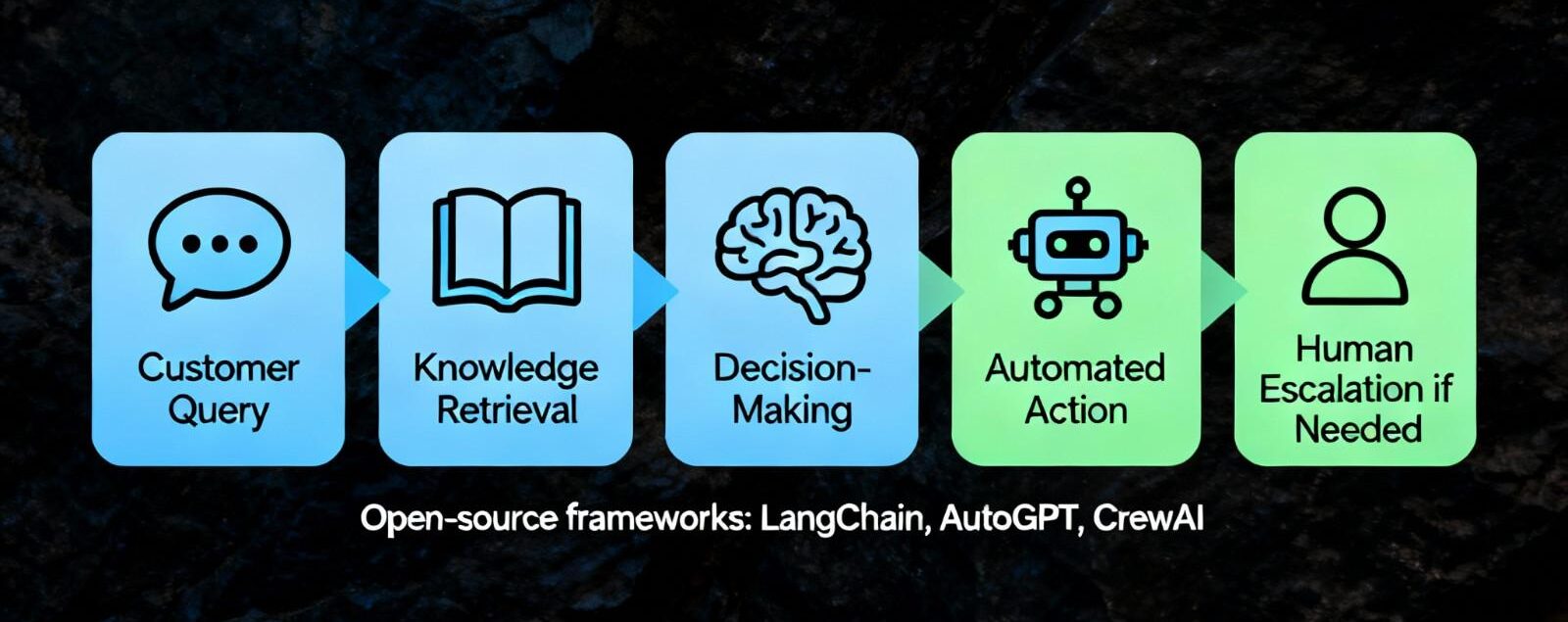
Introduction: Why AI Agents Matter in 2025
AI agents are smart digital tools that can do more than simple tasks. They can help you automate property deals, plan travel trips, and boost online sales. Unlike regular chatbots, AI agents can think, act, and learn from their actions.
In this guide, we will show you what AI agents are, how they work, and where they are used in real life. You will also learn about their business benefits, ROI, ethical considerations, and the top tools available in 2025.
What Exactly Are AI Agents? (Made Simple)
AI agents are digital helpers that can think, act, and learn. They follow a simple cycle that makes them smart over time:
- Work on their own – They don’t need constant supervision.
- Understand context – They remember past interactions to make better decisions.
- Make decisions – They figure out the best action to take.
- Take action – They can send emails, book tickets, or even draft contracts.
By repeating this cycle, AI agents act like digital co-workers, handling both routine and complex tasks efficiently.
How They Work Behind the Scenes
AI agents don’t just give one-off answers—they work in a repeating cycle that helps them get smarter and more useful over time. Here’s the cycle:
- Input – Understanding Commands
- The agent receives a command, prompt, or data.
- Reasoning – Deciding What to Do
- The agent processes the input using AI models and data sources to determine the best action.
- Action – Executing Tasks
- The agent performs the chosen task autonomously.
- Feedback Loop – Learning & Improving
- After the action, the agent analyzes outcomes and adjusts future decisions to improve performance.
Real-World Use Cases Across Industries
AI agents are being rapidly adopted in multiple sectors:
- Real Estate: Lead qualification, virtual property tours, automated contracts.
- Travel: Personalized itineraries, bookings, multilingual support.
- Education: Adaptive tutoring, grading assistance, and student engagement analytics.
- Legal: Contract analysis, compliance monitoring, research assistance.
Marketing & Sales Applications
AI agents are especially powerful in revenue-driven functions:
- Lead Generation: Automated prospecting and CRM follow-ups.
- E-commerce: Personalized product recommendations and cart recovery.
- Affiliate Marketing: Funnel optimization with AI-driven targeting.
- Direct Sales: Automated outreach and sales pipeline management.
Platform Showdown: IBM vs OpenAI vs Google
Choosing the right AI agent platform depends on budget, features, and use case.
| Platform | Strengths | Best For |
|---|---|---|
| IBM Watson | Enterprise-grade, strong compliance | Healthcare, finance, regulated industries |
| OpenAI (GPT + agents) | Advanced reasoning, creativity | Marketing, startups, content automation |
| Google DeepMind | Research-driven, multi-agent systems | Advanced R&D, academic/enterprise labs |
Getting Technical: Architectures & Workflows

AI agents aren’t just apps; they’re built on powerful architectures:
- Agentic RAG (Retrieval-Augmented Generation) – Combines knowledge retrieval with LLM reasoning.
- Multi-Agent Systems – Multiple AI agents collaborating, like specialized departments.
Risks, Ethics & Best Practices
Like any powerful technology, AI agents raise important concerns:
- Privacy: Storing and using sensitive customer data.
- Regulation: Compliance with GDPR, HIPAA, and emerging AI laws.
- Failures: Incorrect recommendations or bias in decision-making.
Best Practices:
- Always keep a human in the loop for critical workflows.
- Ensure transparency in decision-making.
- Set up audits and monitoring for compliance.
Beyond Text: Multi-Modal & Voice-Based Agents
AI agents are evolving beyond text prompts:
- Voice-based agents: Next-gen virtual assistants for bookings and support.
- Multi-modal agents: Can process text, images, and video together.
- Accessibility solutions: Helping the elderly, disabled, and underserved with personalized assistance.
Content & SEO Automation
AI agents aren’t just back-end workers — they’re reshaping digital marketing:
- SEO Agents: Keyword clustering, content gap analysis, backlink scouting.
- Blog Automation: Drafting, optimizing, and publishing at scale.
- Content Optimization: Real-time A/B testing and engagement tracking.
Businesses using AI agents for SEO report up to 40% faster content production and 25% traffic growth within months.
Case Studies
Real Estate Firm: Boosted Lead Conversion
Company: Conversely AI
Challenge: High cost per acquisition in lead generation.
Solution: Deployed Conversely AI’s Lead Insights Platform to optimize lead handling.
Results:
- Improved cost per acquisition by 22%.
- Enhanced lead qualification and conversion efficiency.
Education Platform: Improved Student Retention
Company: Druid AI
Challenge: High student dropout rates.
Solution: Implemented adaptive AI tutoring agents to provide personalized learning experiences.
Results:
- Increased student retention by 6% over 18 months.
- Enhanced learning outcomes through tailored support.
Conclusion: The Future of AI Agents
AI agents are more than simple automation tools—they are partners in digital growth. Whether you run a startup, manage an enterprise with complex workflows, or develop multi-agent systems, 2025 is the perfect time to explore what AI agents can do for you.
